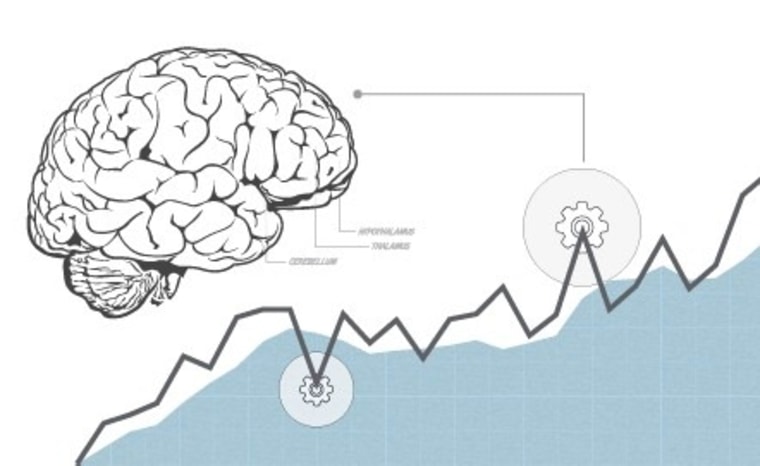While concerns persist that technology might be making us dumber, at least some experts think current and future gadgets will let people enhance and improve their cognitive ability without drugs.
“You can improve your computation abilities,” said Megan Miller, who is program director of research and development at the publishing company Bonnier. Miller was the moderator for a panel on the topic presented Friday at the "South by Southwest" music, film and interactive technology conference, also known as SXSW.
“You can improve your reflexes, your athleticism, your attention, even your sex life,” Miller said.
The promised solutions ranged from better brain games — like the popular handheld Nintendo game, Brain Age, but with better science backing — to yet-to-be invented devices that will track whether people are about to be tempted to break their resolutions, then apply preventive magnetic or electrical stimulation to their heads. Improved sensors, perhaps embedded in people's phones, will enable the latter, Miller said.
At the more conservative end of the spectrum, one panelist emphasized moderation and practice for boosting brain ability.
“Everything you do and experience is having an impact on your brain and how you'll function in the future,” said Michael Scanlon, co-founder of the brain improvement game company Lumosity. Training in sensing, memory and attention will help shape the brain in the right way, he went on.
Lumosity's training games, which cost $14.50 a month (less for yearlong contracts), have attracted more than 20 million users, Scanlon said. University scientists partnered with his company take data from users' play to learn about the brain and improve the games. [Experts Say Google Won't Make Us Stupid, Imagine Post-Google World]
In unpublished research, scientists also surveyed 750,000 users and correlated their habits with how well they did on Lumosity tests, Scanlon said. According to their results, the ideal performers slept seven hours a night, but not less or more; exercised two days a week or more, though more frequent exercisers didn't do better; had one alcoholic drink a day; read books and magazines and played a musical instrument. In other words, they sounded like pretty normal people. That means that being pretty normal works fine, Scanlon thinks.
“Moderation in most of these domains is totally reasonable,” he said. “You don't need to do anything extreme in order to have all these cognitive benefits.”
Radical brain upgrades
That wasn't the message of speaker Dave Asprey, who bills himself as the man who has spent $250,000 trying countless radical, untested brain improvement techniques. In the past 20 years, he said, he has added more than 20 points to his IQ and lost 100 pounds from an original weight of 297, without caloric restriction or exercise. A technology investor and entrepreneur, he now runs BulletProof Executive, which offers free blog entries on his improvement technique, an online store to buy some of the associated products and fee-based personal coaching.
His favorite techniques include a sparse, repetitive game called dual N-back exercises that is the opposite of Lumosity's pretty, engaging products. The exercises were developed by psychologists at the University of Bern in Switzerland in 2003. They were meant for research, not for fun.
“It is boring and frankly it pisses you off,” Asprey said. But, he said, they work to raise IQ. Another favorite is using a device to monitor the heartbeat, then breathing in a slow, controlled way to achieve very regular heartbeats. This replicates the benefits of meditation, but is much faster to learn, Asprey said.
He also directly stimulates his brain with infrared LEDs and low pulses of electricity. “The current state of some of this stuff is prototype at best, but it can be made safe, at least most of the time,” he said.
Overall, his system costs about $10,000, but he thinks it's well worth it. “This is not a huge amount of money for the amount of transformation you can have in relative short order,” he said. He calls what he does “bio-hacking” or “body hacking.”
Risky brain business?
All revolutionary new brain improvement techniques will carry some risk, said panelist Dan Wetmore, a former Stanford University neuroscience research fellow, in response to a question from InnovationNewsDaily. It's up to individuals to decide how much risk they want to take. “I'd rather take the risk and get a boost,” Wetmore said.
During the panel, Wetmore envisioned future brain-enhancement programs people would carry around with them, as an application in their mobile devices. The program would learn its owners' habits, such as his diet and social life, and discover what situations triggered poor decisions. It would have technology that recognized where it was, for example, if its owner was in fast-food restaurant, and apply electrical or magnetic stimulation to prevent the person from choosing bad food. Wetmore has founded a startup company, Sheepdog Sciences, to develop brain-improvement technologies.
His and Asprey's ideas can sound strange and extreme, but humankind actually has a long history of brain hacking, Miller said. People have used coffee, drugs, antidepressants and meditation to achieve altered states of mind. They've invented the printing press, the computer and the Internet to supplement their memories. “It's part of what essentially makes us human,” she said.
Perhaps that explains the appeal of even some of more unusual difficult techniques. “I'm a bio-hacker,” one audience member said during the question-and-answer session. Afterward, when audience members approached the panelists with individual questions, it was Asprey who drew the most questioners.
“I highly recommend you start playing now,” Asprey said. After all, who doesn't want to be smarter?
You can follow InnovationNewsDaily staff writer Francie Diep on Twitter @franciediep. Follow InnovationNewsDaily on Twitter @News_Innovation, or on Facebook.
